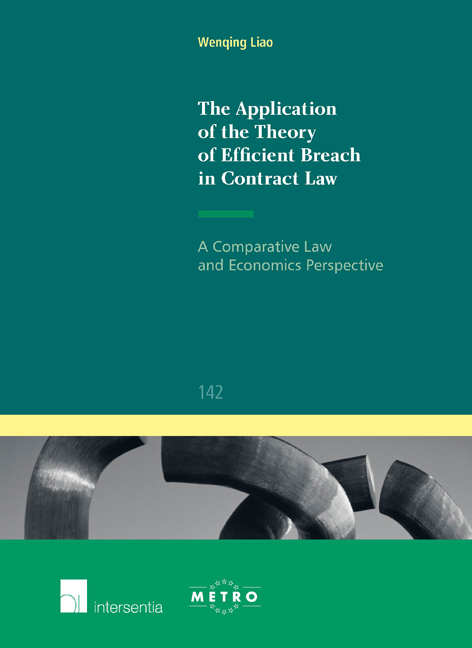 The Application of the Theory of Efficient Breach in Contract Law
The Application of the Theory of Efficient Breach in Contract Law Published online by Cambridge University Press: 12 December 2017
In voluntary transactions, efficiency is enhanced because goods and services will be allocated to the best user and surpluses will be created. But the time lapse between the formation of a contract and its performance creates risks and uncertainties. This problem will be increased by the problems of opportunism, distrust and incomplete contracts. Thus the efficiency of transactions can be endangered. Since the market cannot always work efficiently, it is required that contract law is introduced as a supplementary mechanism for transactions. Economists assume that there is a close relationship between the structure of contract damage rules, people's behaviour and social efficiency. An efficient law is able to facilitate people's capacity for welfare maximization in the transactions, and to promote social efficiency. This chapter will first indicate the economic reasons why people make contracts and what would happen if there were no contract law. Afterwards, the economic functions of contract law will be provided in section 2. Section 3 will further provide the economic theory of the binding effect of a contract. One important result of the binding effect is that if one party to a contract breaches, the non-breaching party will be entitled to contract remedies. A basic economic theory of contract remedies will be included in section 4. Section 5 will conclude.
Economic Analysis of Contracts
Voluntary Transactions and Efficiency
Voluntary transactions are justified both in the traditional legal theory and from an economic perspective. Lawyers relate them to the principle of freedom of contract. But economists pay more attention to the welfare that can be created through transactions. Suppose there are two parties Y and X. Yhas a machine that is worth 50 euros to him but is worth 150 euros to X. According to economists, a rational person is assumed to be interested in welfare maximization and he will take actions which make him better off.
In this case, X might obtain this machine either through producing a similar one for himself or buying it from Y at a price lower than 150 euros. But Y would be willing to give up the machine only if he could acquire more than 50 euros.
To save this book to your Kindle, first ensure [email protected] is added to your Approved Personal Document E-mail List under your Personal Document Settings on the Manage Your Content and Devices page of your Amazon account. Then enter the ‘name’ part of your Kindle email address below. Find out more about saving to your Kindle.
Note you can select to save to either the @free.kindle.com or @kindle.com variations. ‘@free.kindle.com’ emails are free but can only be saved to your device when it is connected to wi-fi. ‘@kindle.com’ emails can be delivered even when you are not connected to wi-fi, but note that service fees apply.
Find out more about the Kindle Personal Document Service.
To save content items to your account, please confirm that you agree to abide by our usage policies. If this is the first time you use this feature, you will be asked to authorise Cambridge Core to connect with your account. Find out more about saving content to Dropbox.
To save content items to your account, please confirm that you agree to abide by our usage policies. If this is the first time you use this feature, you will be asked to authorise Cambridge Core to connect with your account. Find out more about saving content to Google Drive.